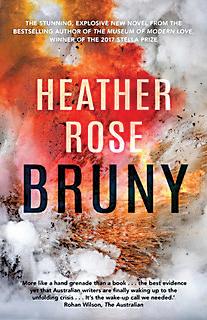
3 minute read
Review
TOP 4 BOOKS TO READ THIS MONTH
Before You Knew My Name by Jacqueline Bublitz This is not just another novel about a dead girl. Alice Lee and Ruby Jones, murder victim and the girl who finds the body, form an unlikely bond in this debut page-turner.
Palace of the Drowned by Christine Mangan Set around the 1966 flood - the worst experienced by Venice - the trajectory of the disaster forever altered the city, mirrors Frankie’s own inner turmoil as she struggles to make sense of what is and is not the truth.
Rum – A Distilled History of Colonial Australia by Matt Murphy Brimming with detailed research and irreverent character sketches, Rum looks at how much was drunk in colonial Australia (a lot!), and the lengths people went to get their hands on it.
The Silly Seabed Song by Aura Parker Popular local author, Aura Parker, brings us another gorgeous picture book to add to our collections.
Purchase a copy at the Burns Bay Bookery to go in the draw to win a limited edition print of...the Silly Seabed!
A BOOK LOVER’S REVIEW BY JACQUI SERAFIM
Bruny
by Heather Rose

Bruny, by Stella prize-winning author Heather Rose is set in Australia a few years into the future. It is essentially a political novel – part thriller, part satire – with elements of family drama and a celebration of Tasmania’s isolated beauty. The novel posits a frighteningly conceivable future where the re-elected right-wing US president withdraws from the UN and Afghanistan, ISIL continues to grow in strength and China develops strong economic ties with Australia. Bruny addresses a broad range of contemporary issues including government corruption, environmental protection and chequebook diplomacy.
In peaceful Tasmania, a massive bridge is under construction to connect tiny beautiful Bruny Island with mainland Tasmania. The community is split over whether the bridge represents progress and economic opportunity or destruction of the quiet island life enjoyed by the locals. Why is the commonwealth government investing so much in its construction? Is a sixlane highway really necessary to support tourism? Three months before completion, an explosion almost destroys the bridge. Who is responsible and why? When large numbers of Chinese workers are flown in to complete the bridge with Chinese steel before election date, the Tasmanian Premier, JC Coleman, calls on his twin sister, Astrid, a UN mediator, to help manage the situation.
Astrid (Ace), a divorced mother of two grown children, lives in New York and travels the world resolving humanitarian crises in war zones. She flies home to Tasmania and is forced to face the family she left behind decades before. Ace’s brother, JC, is the Tasmanian Premier and their half-sister, Max, is the leader of the Opposition. Her beloved father, Angus Coleman, is a previous Premier of the State but now, after several strokes, speaks only in Shakespearean quotes. Their self-absorbed mother, Hyacinth, is dying of cancer. As Ace liaises with the politicians, the Chinese authorities, the local activists and her family members, it becomes clear to her that there is more to the situation than meets the eye and she is determined to find out the truth and protect her beloved island home.
Although this is essentially a plot-driven novel, the key characters are well-drawn and very convincing. I particularly enjoyed Astrid’s character and her narrative voice – her intelligence, her irony, her world-weariness and her courage. Her observations on the political, economic and social issues confronting the world are insightful and compelling. Many of the secondary characters are somewhat formulaic by comparison - easily recognizable archetypes like the dodgy politicians and smug public servants but this does not detract from the narrative.
Although the resolution has a worrying premise (no spoilers here – read the novel), it is an entertaining work of fiction that raises some frightening questions about the corruption of governments and the power of capital. The novel emphasises the short term thinking of Australia’s politicians and the continual sale of our precious land and its resources. It also raises questions about Australia’s long term strategies for economic and agricultural security and environmental protection and the dangers of the erosion of liberal democracy.
Bruny won the 2020 ABIA General Fiction Book of the Year










